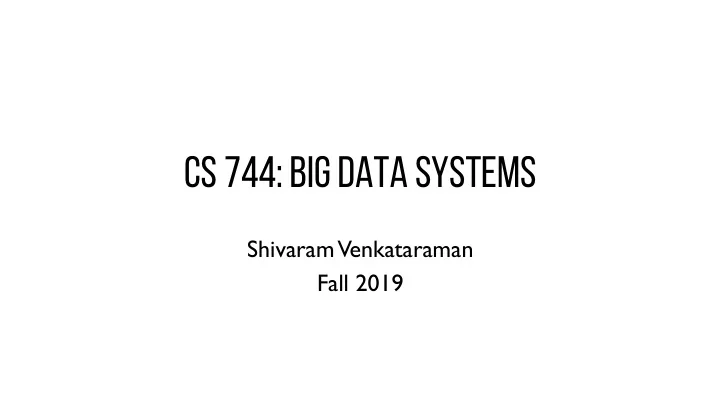

CS 744: Big Data Systems Shivaram Venkataraman Fall 2019
Who am I ? Assistant Professor in Computer Science PhD Thesis at UC Berkeley: System Design for Large Scale Machine Learning Industry: Google, Microsoft Research Open source: Apache Spark committer
Call Me Shivaram or Prof. Shivaram
TODAYS AGENDA What is this course about? Why are we studying Big Data systems? What will you do in this course?
BRIEF HISTORY oF BIG DATA
Google 1997
Data, Data, Data “…Storage space must be used efficiently to store indices and, optionally, the documents themselves. The indexing system must process hundreds of gigabytes of data efficiently…”
Google 2001 Commodity CPUs Lots of disks Low bandwidth network Cheap !
Datacenter Evolution 15 Moore's Law 10 Facebook’s daily logs: 60 TB Overall Data 5 Google web index: 10+ PB 0 2010 2011 2012 2013 2014 2015 (IDC report*)
“scientific breakthroughs will be powered by advanced computing capabilities that help researchers manipulate and explore massive datasets” -- Jim Gray
SCIENTIFIC applications
SOLAR FLARE prediction ~ 2 PB Working with data from Solar Dynamics Observatory [Brown et. al SDO Primer 2010] Solar Flare Prediction Using Photospheric and Coronal Image Data. [Jonas et. al American Geophysical Union, 2016]
18( Graph(based(on( 16( average(growth( Detector( 14( Sequencer( 12( Processor( Memory( 10( 8( 6( 4( 2( 0( 2010( 2011( 2012( 2013( 2014( 2015( Source: More Data, More Science and... Moore’s Law [Kathy Yellick ]
Datacenter Evolution Google data centers in The Dulles, Oregon
Datacenter Evolution Capacity: ~10000 machines Bandwidth: Latency: 12-24 disks per node 256GB RAM cache
Jeff Dean @ Google
How do we program this ?
BIG DATA SYSTEMS
Applications Machine Learning SQL Streaming Graph Computational Engines Scalable Storage Systems Resource Management Datacenter Architecture
Course syllabus
What do you hope to learn from the course? To be able to evaluate the research papers more effectively … I hope learn to design systems used for big data processing … Learn about current day technologies that are used to manage large amounts of data … Learn how to implement a machine learning project on big data. Both theory and applications of big data systems, i.e., how to design, how to implement and how to evaluate.
LEARNING OBJECTIVES At the end of the course you will be able to • Explain the design and architecture of big data systems • Compare, contrast and evaluate research papers • Develop and deploy applications on existing frameworks • Design, articulate and report new research ideas
LEARNING OBJECTIVES At the end of the course you will be able to • Explain the design and architecture of big data systems Paper Review • Compare, contrast and evaluate research papers Discussion • Develop and deploy applications on existing frameworks Assignment • Design, articulate and report new research ideas Project
CLASS Format Schedule: http://cs.wisc.edu/~shivaram/cs744-fa19 Reading: 1 paper per class Review: Fill out review form (posted on Piazza) by 9am Discussion: In-class group discussion, submit responses (Best15 out of 20 responses)
HOW TO READ A PAPER: EXAMPLE
HOW TO READ A PAPER: SUMMARY 1 st pass: Read abstract, introduction, section headings, conclusion 2 nd pass: Read all sections, make notes Some key points - What is the problem being considered? - What are the main contributions? How do they compare to prior work? - What workloads, setups were considered in the evaluation? - What parts of the claims are adequately backed up? …
Paper REVIEW, DISCUSSION Examples - One or two sentence summary of the paper - Description of the problem or assumptions made - Comparison to other papers discussed in class - One flaw or thing that can be improved - Experimental setup and what do the results mean
ASSESSMENT • Paper reviews: 10% • Class Participation: 10% • Assignments (in groups): 20% (2 @ 10% each) • Midterm exams: 30% (2 @15% each) • Final Project (in groups): 30%
Assignments Two homework assignments in Python using NSF CloudLab - Assignment 0: Setup CloudLab account - Assignment 1: Data Processing/Spark - Assignment 2: Machine Learning/Tensorflow Short coding based assignments. Preparation for course project Work in groups of three
Course Project Main grading component in the course! Goal: Explore new research ideas or significant implementation in the area of Big Data systems Research: Work towards workshop/conference paper Implementation: Work towards open source contribution
COURSE PROJECT EXAMPLES Example: Research How do we scheduling distributed machine learning jobs while accounting for performance, efficiency, convergence ? Example: Implementation Implement a new module in Apache YARN that allows GPUs to be allocated to machine learning jobs.
Course PROJECT Project Selection: - List of course project ideas will be posted around (9/12) - Form groups of three - Pick one or more ideas or propose your own! - Submit project ideas, instructor feedback/finalize idea (9/26), Assessment: - Project introduction write up - Poster presentation - Final project report
Course Logistics Instructor office hours: Mon 11-12am at 7367 CS Ainur’s office hours: Mon 2-3pm and Thu 2-3pm at 4291 CS Discussion, Questions: Use Piazza!
WAITLIST - Class size is limited to 60 for this semester - Focus on research projects, discussion - Course is offered both semesters - Limited undergraduate seats If you are enrolled but don ’ t want to take, please drop ASAP! If you are on the waitlist and have a pressing case, send email
BEFORE NEXT CLASS Join Piazza: https://piazza.com/wisc/fall2019/cs744 Complete Assignment 0 (see website)
Recommend
More recommend